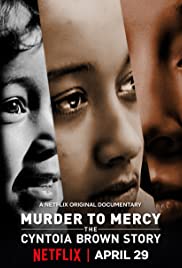In 2004, a Nashville real estate agent and youth minister named Johnny Allen was found dead in his home. He had been shot in the back of his head, while lying naked in bed. The police claimed that he had been asleep when he was shot. Cyntonia Brown, the 16 year-old runaway who was arrested for the crime, claimed that Allen had been awake and that he had been reaching for a gun when she shot him. Cyntonia Brown was subsequently convicted of first degree murder and sentenced to life in prison. She wouldn’t be eligible for parole until she served 51 years of her sentence.
From the start, there were questions about whether or not justice was done in the case of Cyntonia Brown. Naively, she waved her Miranda rights after she was arrested, believing the detective’s claim that it would help her case if she just talked to them. (Is a sixteen year-old mature enough to make the decision whether or not to talk to the police without an attorney present?) Brown had spent years being abused by sexual predators, like her “boyfriend” Garion “Kut-Throat” McGlothen. As well, there was evidence that she may have suffered from Fetal alcohol spectrum disorder, as a result of her mother having been an alcoholic. FASD can lead to uncontrollable behavioral and perception issues. With all of that in mind, should Cyntonia Brown have been sentenced to 51 years in prison?
In 2011, a documentary called Me Facing Life: Cyntonia’s Story aired on PBS. Directed by Daniel Birman, Me Facing Life generated renewed interest in Brown’s case. When Brown, who was described as being a model prisoner, petitioned Tennessee Governor Bill Halsam for clemency, her cause became a cause célèbre for many (which is another way of saying that it trended on twitter for a few days). In 2019, Gov. Halsam commuted Brown’s sentence to 15 years plus 10 years of supervised probation. Cyntonia Brown was released and is today an activist for criminal justice reform.
Murder To Mercy is Daniel Birman’s follow-up to Me Facing Life. The first half of the film is largely made up for footage from Me Facing Life while the 2nd half deals with Brown’s clemency hearing. Unfortunately, Murder to Mercy only provides a surface-level examination of Cyntonia Brown’s case. One can fully believe that her initial sentence was too harsh (as do I) and one can also believe that she was failed by the system (and again, I do) while also acknowledging that Murder to Mercy is a bit too one-sided in its presentation of the case to really be effective.
For example, even if you do believe that Johnny Allen was reaching for a gun or that Cyntonia Brown did have a justifiable reason to consider herself to be in danger, it’s still hard not to notice that his family is only present in one scene. Since Allen’s family has been quite vocal in their opposition to Cyntonia Brown’s release, pushing them to the side doesn’t feel right. (This wouldn’t bother me as much if the documentary had said, “Johnny Allen’s family refused to be interviewed for this documentary.” That, at least, would have explained their absence. As it is, it just feels like they were left out because the film isn’t interested in anything that might complicate the narrative.)
The film makes the argument that Cyntonia Brown was treated unfairly by the criminal justice system. It does make one very good point. When she was arrested in 2004, Tennessee law classified her as being a prostitute. In other words, even before she was convicted of murder, she was classified as being a criminal instead of a victim. Later, in response to criticism over Brown’s sentencing, the law was changed so that minors could not be charged with prostitution. Instead, they are now classified as victims of sex trafficking. That’s one of the good things to come out of the Cyntonia Brown case. Oddly enough, though, the film doesn’t explore the role that race may or may not have played in the harsh sentencing of Cyntonia Brown. If Brown was a white girl from the suburbs who had been forced into prostitution at the age of 12 and who had subsequently felt that her life was in danger, would she have been sentenced to, at minimum, 51 years in prison? That’s an issue that goes largely unexplored.
Cyntonia Brown’s story is a complicated one and it’s also one that deserves to be told. Unfortunately, this heartfelt but surface level examination doesn’t really do justice to anyone or any of the issues involved.

Pingback: Lisa’s Week In Review: 9/28/20 — 10/4/20 | Through the Shattered Lens